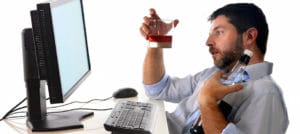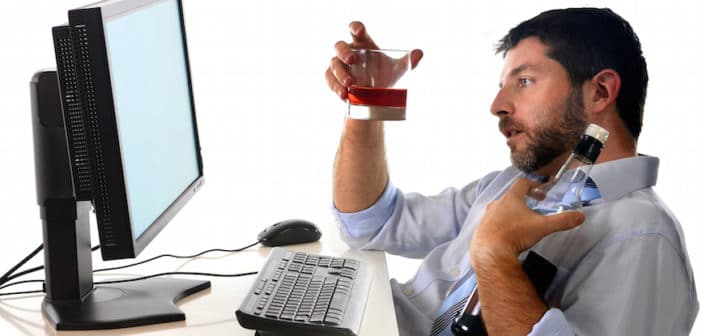 Over the years, I’ve worked as a children’s librarian, video store clerk, bookstore cashier, newspaper marketing specialist, textbook editor, college instructor, bar trivia host and movie theater projectionist. Not in that order. I even had a short gig guarding a kiosk of calendars in the saddest wing of a dead shopping mall. My job was to make sure all the Thomas Kinkade and dog breed calendars were lined up just right. That job was the definition of how I felt as an alcoholic: alone, not understanding how I got there, endlessly circling nonsense.
Over the years, I’ve worked as a children’s librarian, video store clerk, bookstore cashier, newspaper marketing specialist, textbook editor, college instructor, bar trivia host and movie theater projectionist. Not in that order. I even had a short gig guarding a kiosk of calendars in the saddest wing of a dead shopping mall. My job was to make sure all the Thomas Kinkade and dog breed calendars were lined up just right. That job was the definition of how I felt as an alcoholic: alone, not understanding how I got there, endlessly circling nonsense.
When I was drinking, people who held down good jobs fascinated me. I never understood what was wrong with them. People were supposed to temporarily wash into jobs, like shells in shallow tide pools, before being swept back out to sea. I’d give any random job 200% before suddenly, without warning, deciding that enough was enough. That’s how my alcoholic brain worked. There were no middle gears—it was all or nothing. When I found myself unemployed with two young kids, it wasn’t because I was laid off. I’d downsized myself in a blaze of glory via an angry, blind “That’ll teach them” email, cc’ing everyone. I remember firing off that email with a sense of self-righteousness that could only come from Labatt Blue and Popov flushing through every cell in my body. For five minutes after hitting “Send,” I felt more alive than I’d ever felt. Then the crushing wave of reality hit, so I drank more.
No freelance work magically came to my rescue. Our savings account evaporated. Soon enough, a realtor was hammering a “For Sale” sign in the front lawn. When I wasn’t in AA meetings, I lived on Indeed.com and constantly scoured Craigslist on my laptop, using high-speed Internet we couldn’t afford anymore. I’d wrongly assumed I would be able find a job in a couple of weeks. When I finally got an interview, I prepared myself less to answer questions than I did to hide the desperation in my eyes.
Almost six months to the day of getting sober, I showed up for my first day at work. This time, I arrived feeling ready and respectful. It’s as corporate as it gets—cubicle walls and conference calls—but I’ve never once taken it for granted. Quite the opposite. I treat my job like a lover who I’m afraid will suddenly leave me in the middle of the night. I cater to it, I make sure it’s happy—I give it a sustained 100%. But in corporate culture, there are strictures, rules, core competencies and expected behaviors. It’s as much about titles as it is about perception. Whatever people think about you, true or not, becomes the reality. I was terrified of anyone finding out I was a recovering alcoholic.
Recently, there was a holiday happy hour for work I couldn’t avoid. It was mandatory. Executive leaders would be there to celebrate our department’s accomplishments. For weeks, the event throbbed on my calendar like a splinter deep under my skin. I agonized over how I’d have to order water, showing weakness in front of effective people who could successfully drink. At the last second, I decided I couldn’t do it. “I’m a recovering alcoholic,” I confessed to my manager. “I just don’t feel comfortable attending this.” He quickly thanked me for telling him, saying it was fine and that he absolutely understood. I was immediately filled with relief instead of shame. In fact, I was downright proud of myself, having stood up for my sobriety.
One hour later, at no fault of my manager’s, I was standing in a bar with my entire department.
I hadn’t been in a bar since getting sober. Panic seized me. I uneasily ordered a tonic water with lime, praying no one noticed. I smelled the glass three times before taking a tentative sip, as if it may have been poisoned. All of the rhythms and routines of my past life came rushing back. I was better at drinking in bars than I was at my job. However, drinking had cost me a job and now a new job was the very thing delivering me to my old enemy. I breathed, told myself to get through the next hour without anyone paying attention and then I could leave. Sure enough, a co-worker sidled up and asked what I was drinking. (To be fair, the glass I was holding could’ve held a quadruple vodka tonic.) I came clean and told her I was sober. Instantly, I felt the same relief I had just an hour beforehand with my manager.
Then it occurred to me that maybe I’d been trying to hide something I didn’t need to. In all the ways I thought alcohol helped me survive social work situations, the truth actually armed and defended me. It made me stronger. For the very first time, I genuinely didn’t care if my co-workers or managers perceived me differently. After decades of lying to myself and everyone else, honesty wasn’t second nature to me, but it felt right.
A large part of being successful in any job is not bringing your personal life through the front door. So, if I share with co-workers about my past, I do it carefully. But sometimes, if the moment presents itself, I look at it as a gift. I can be human in a world where people routinely say things like “let’s not boil the ocean here” with a straight face. The last time I had a full-time job, I was such a wrecking ball near the end—drinking in the bathroom to keep myself afloat—that it’s a reminder for me to see how far I’ve come. If I don’t share my past, I’m dooming myself to repeat it somewhere down the road. I have to be honest with absolutely everyone, including the people I work with. In most ways, I apply myself as hard at my job as I do at my recovery. In both places, my work speaks for itself.
Sponsored DISCLAIMER: This is a paid advertisement for California Behavioral Health, LLC, a CA licensed substance abuse treatment provider and not a service provided by The Fix. Calls to this number are answered by CBH, free and without obligation to the consumer. No one who answers the call receives a fee based upon the consumer’s choice to enter treatment. For additional info on other treatment providers and options visit www.samhsa.gov.




